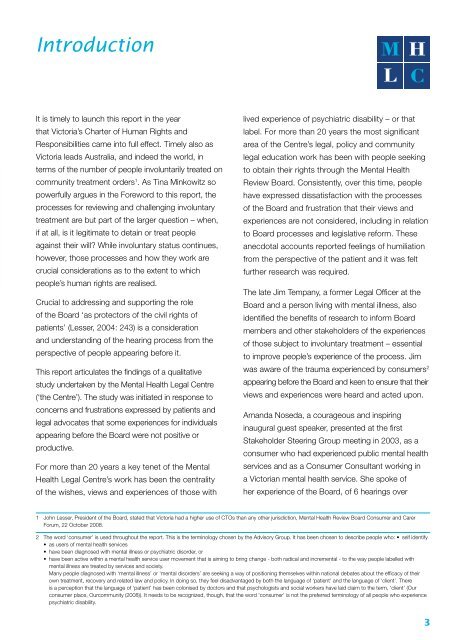Lacking Insight - Community Law
Lacking Insight - Community Law
Lacking Insight - Community Law
- No tags were found...
Create successful ePaper yourself
Turn your PDF publications into a flip-book with our unique Google optimized e-Paper software.
IntroductionIt is timely to launch this report in the yearthat Victoria’s Charter of Human Rights andResponsibilities came into full effect. Timely also asVictoria leads Australia, and indeed the world, interms of the number of people involuntarily treated oncommunity treatment orders 1 . As Tina Minkowitz sopowerfully argues in the Foreword to this report, theprocesses for reviewing and challenging involuntarytreatment are but part of the larger question – when,if at all, is it legitimate to detain or treat peopleagainst their will? While involuntary status continues,however, those processes and how they work arecrucial considerations as to the extent to whichpeople’s human rights are realised.Crucial to addressing and supporting the roleof the Board ‘as protectors of the civil rights ofpatients’ (Lesser, 2004: 243) is a considerationand understanding of the hearing process from theperspective of people appearing before it.This report articulates the findings of a qualitativestudy undertaken by the Mental Health Legal Centre(‘the Centre’). The study was initiated in response toconcerns and frustrations expressed by patients andlegal advocates that some experiences for individualsappearing before the Board were not positive orproductive.For more than 20 years a key tenet of the MentalHealth Legal Centre’s work has been the centralityof the wishes, views and experiences of those withlived experience of psychiatric disability – or thatlabel. For more than 20 years the most significantarea of the Centre’s legal, policy and communitylegal education work has been with people seekingto obtain their rights through the Mental HealthReview Board. Consistently, over this time, peoplehave expressed dissatisfaction with the processesof the Board and frustration that their views andexperiences are not considered, including in relationto Board processes and legislative reform. Theseanecdotal accounts reported feelings of humiliationfrom the perspective of the patient and it was feltfurther research was required.The late Jim Tempany, a former Legal Officer at theBoard and a person living with mental illness, alsoidentified the benefits of research to inform Boardmembers and other stakeholders of the experiencesof those subject to involuntary treatment – essentialto improve people’s experience of the process. Jimwas aware of the trauma experienced by consumers 2appearing before the Board and keen to ensure that theirviews and experiences were heard and acted upon.Amanda Noseda, a courageous and inspiringinaugural guest speaker, presented at the firstStakeholder Steering Group meeting in 2003, as aconsumer who had experienced public mental healthservices and as a Consumer Consultant working ina Victorian mental health service. She spoke ofher experience of the Board, of 6 hearings over1 John Lesser, President of the Board, stated that Victoria had a higher use of CTOs than any other jurisdiction, Mental Health Review Board Consumer and CarerForum, 22 October 2008.2 The word ‘consumer’ is used throughout the report. This is the terminology chosen by the Advisory Group. It has been chosen to describe people who: • self identify• as users of mental health services• have been diagnosed with mental illness or psychiatric disorder, or• have been active within a mental health service user movement that is aiming to bring change - both radical and incremental - to the way people labelled withmental illness are treated by services and society.Many people diagnosed with ‘mental illness’ or ‘mental disorders’ are seeking a way of positioning themselves within national debates about the efficacy of theirown treatment, recovery and related law and policy. In doing so, they feel disadvantaged by both the language of ‘patient’ and the language of ‘client’. Thereis a perception that the language of ‘patient’ has been colonised by doctors and that psychologists and social workers have laid claim to the term, ‘client’ (Ourconsumer place, Ourcommunity (2008)). It needs to be recognized, though, that the word ‘consumer’ is not the preferred terminology of all people who experiencepsychiatric disability.3
















